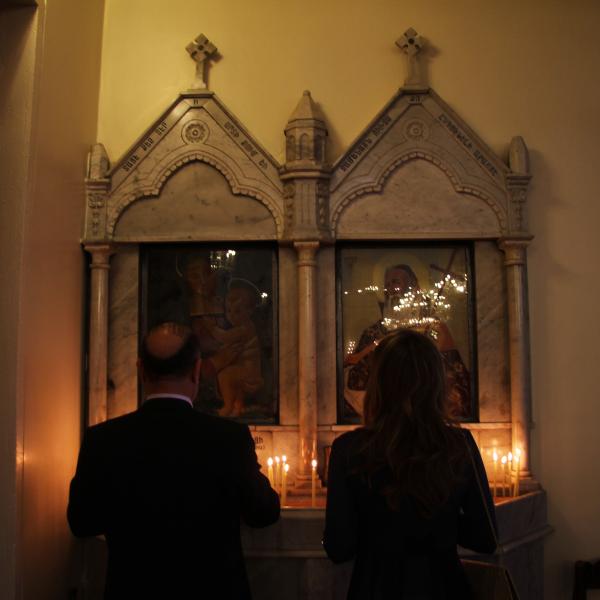
At St. Elie Armenian Catholic Church in downtown Beirut, Zarmig Hovsepian lit three candles and slowly mouthed silent prayers before Easter Mass. After reciting "Our Father," she added a prayer of her own: "For peace, for Lebanon and the region," she said, underscoring the deep sense of apprehension beneath the surface of otherwise festive Easter celebrations.
Next door in Syria, violence recently displaced thousands from the historic Armenian town of Kessab, which rests in northwestern Syria, along the Turkish border. Groups of Syrian rebels, including some with ties to al-Qaida, swept into the Latakia province last month, seizing a number of towns in the strategically important mountains.
The violence and mass displacement in Syria opened old wounds for Armenians across the region, stirring up memories of the massacre and deportation of ethnic Armenians at the hands of the Turks during World War I. Syria, once a refuge from that violence, is home to nearly 100,00 Armenians, but now the community feels under threat again.
That’s making Armenians in Lebanon nervous.
"The future is not clear for the whole Christian community in the Middle East, not just the Armenians," says Shahan Kandaharian, the executive editor of an Armenian daily newspaper. He blames the rise of Islamic fundamentalism across the Middle East.
"We’ve seen what happens to Christians in Iraq," he says, referencing the hundreds of thousands of Christians who have fled as extremism has risen in the last decade.
As Islamist opposition groups in Syria grow in power, Christians increasingly find themselves caught up in the civil war. In December, a group of nuns was kidnapped from their convent in the ancient town of Maaloula and held for three months; they were released only in March. In the northern city of Raqqa in February, a Jihadist group imposed strict rules on Christians, outlawing public prayer and the ringing of church bells.
Part of the resentment toward Syrian Christians can be traced to their relationship with the government of Syrian President Bashar Assad. Himself a member of the minority Allawite sect of Islam, Assad has long positioned his government as a protector of all minorities. In turn, he has gained the often-tacit support of many of the country’s Christians.
In comments to mark the Easter holiday, John Yazigi, the Greek Orthodox patriarch in Syria, said Christians "will not submit and yield" to extremists. He called on all sides to end the practice of "intimidation, displacement [and] extremism."
But Krikor Geukjian, a member of St. Elie Church, says that for Armenians, the situation is different. He says that for his community, memories of genocide are not just a shared history; they’re personal.
"It has affected every single Armenian. Every single Armenian knows a victim," Geukjian says. "It’s a wound that doesn’t close."
A man who asked not to be identified agrees. He says he was born in Beirut and has lived here all his life, but never feels completely relaxed. "I always have all my documents ready," he says, in case the political or security situation changes and he’s forced to flee.
Now, standing in front of St. Elie Church as some of the last worshipers file into the Easter service, Geukjian says that despite all his worries, he’s always hopeful about the future. When asked why, he laughs.
"Perhaps it’s our Armenian-ness," he says. "We’ve learned from our history that after every bad thing comes a better thing. Otherwise, we couldn’t have survived all those centuries."




